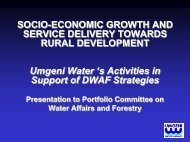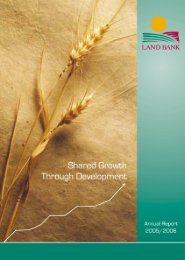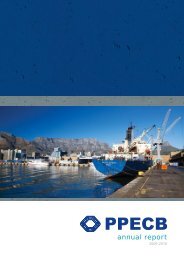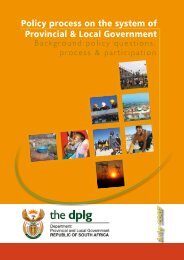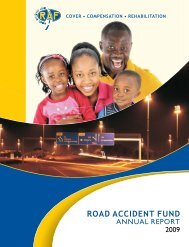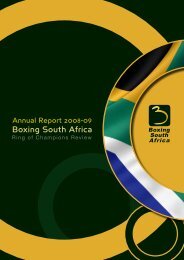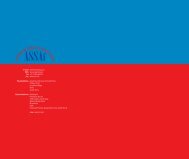PMG MONITOR - May 2011 - Parliamentary Monitoring Group
PMG MONITOR - May 2011 - Parliamentary Monitoring Group
PMG MONITOR - May 2011 - Parliamentary Monitoring Group
You also want an ePaper? Increase the reach of your titles
YUMPU automatically turns print PDFs into web optimized ePapers that Google loves.
<strong>May</strong> <strong>2011</strong><strong>MONITOR</strong>A monthly briefing sheet to keep CBOs informed about what is happening in ParliamentWhat do they do?National Lotteries BoardThe National Lotteries Board,an entity reporting to theDepartment of Trade andIndustry, has threedistributing agencies. Of thefunding available, Sports andrecreation receives 22%,whilst Arts, Culture, Nationalheritage and Eco-tourismreceive 28%, and Charitiesreceive 45%. 5% is allocatedfor “miscellaneous use”. TheNational Lottery DistributionTrust Fund (NLDTF) and theprocess for distribution areset out in the legislation.Applications for funding mustbe done through the CentralApplications Office, by fillingout a form (available on theBoard’s websitewww.nlb.org.za), givingmotivations and providingtwo audited financialstatements. Those who mayapply include NGOs, CBOs,community trusts andcommunity foundations,schools and universities, andmuseums and developmentagencies. However, familytrusts and family foundationsmay not apply. If auditedstatements are not availablethere is an option for theapplicant to enter into apartnership agreement, evenwith a municipality. Newregulations require equaldistribution between rural andurban areas. For every R1million allocated, six full timejobs should be created, andjob creation and povertyalleviation are priorities.Labour Law ChangesChanges have been announced to the labour laws,to address the increased “casualisation” of work inSouth Africa, and bring the legislation in line withlabour developments. The changes are all aimed atavoiding exploitation of workers, ensuring decentwork, and improving the functioning of theCommission for Conciliation Mediation andArbitration (CCMA).The Labour Relations Amendment Bill will attemptto stop the practice of employers insisting uponrepeating contracts for short-term periods.Employers will in future be required to justify whythey are using contracts instead of permanentemployment.The Basic Conditions of Employment AmendmentBill aims to regulate contract work, sub-contractingand outsourcing, address labour broking problems,prohibit some abusive practices, and allow theMinister to prescribe thresholds to facilitateunionisation within a sector or area.The Employment Equity Amendment Bill aims toensure compliance with South Africa’s internationalobligations, enhance prevention of unfairdiscrimination, and level racial demographics, whileallowing dissatisfied individuals to approach theLabour Court. Fines for non-compliance will beincreased. Private arbitration will still be possible,but will be regulated to prevent abuse orinfringement of workers’ rights.The Employment Services Bill aims to provide alegal framework for employment services, andassist employers and workers to adjust to changinglabour market conditions. Opportunities for citizenswill be promoted over those for foreign workers, asemployers in designated sectors will be required tomake use of the public employment service beforeemploying foreign nationals, and must notify theDepartment of any vacancy or new position, as wellas the filling of vacancies.The Department of Labour is not seeking to act asa labour broker, but is trying to ensure that theright people will be assigned to the right jobs.What is now available?Draft regulationsfor ConsumerProtection Acthave beenpublished. Anexplanation of theAct & Regulationscan be found at theNational ConsumerForum website:www.ncf.org.zaMinisters have, sinceApril, been deliveringbudget speeches, andmore will be deliveredafter Parliament’srecess, starting 24 <strong>May</strong>.Find out their plans onhow to spend thismoney. These can beaccessed on the homepage of the <strong>PMG</strong>website:www.pmg.org.zaThe Charter on theRights of OlderPersons was officiallylaunched in <strong>May</strong>. Itcan be accessed atwww.saopf.org.za/charter.htmlThe Department ofSocial Developmentplans to roll out the KeMoja programme (I’mfine without drugs) toall schools, includingprivate schools
SAMAF Disaster Management New policy documents and initiativesAn allocation of R600 millionhas been made for disastermanagement recovery andrehabilitation in floodedareas. Currently,independent serviceproviders are assessingdamages and quotationsacross eight provinces and33 municipalities.The South African MicrofinanceApex Fund (Samaf)supports entrepreneurship,by acting as a catalyst todevelopment of a vibrantmicro-finance industry.Samaf does not deal directlywith the end-users(individuals and smallenterprises) but insteadaims to set up FinancialIntermediaries incommunities, and offerthem services, includingaccess to funds for onlending,development ofinstitutional capacity andcreation of partnerships, sothat they become selfsustainingand can providefinance to communities.New proposals have beenmade to offerdevelopmental loans via aSavings Mobilisation andformalisation fund, intendedfor start-ups, savings clubsand small institutions, with alimit of R200 000. There arealso loans ranging from R1million to R10 million. Thefunding provided by theFinancial Intermediaries willassist small businesses andentrepreneur developmentand empowerment,especially for women andyouth: www.samaf.org.zaSALGAThe South African LocalGovernment Association isnot responsible for servicedelivery to citizens, butassists its membermunicipalities withcoordination, support,lobbying and capacitybuilding. SALGA willmanage the transition ofleadership in municipalitiesafter the municipal elections,including labour relations,and councillor induction,through its TransitionManagement Framework. Itis also involved in wagenegotiation processes withSA Municipal Workers’Union and other unions.Most of the funding fromthe Disaster Relief Fund willbe used to repair schools,roads and bridges, butseveral other departments,including Water Affairs, andAgriculture, will be fundingrepairs to water supplyinfrastructure andagricultural infrastructure. Ithas become clear that notall sector departments atlocal level have disastermanagement capacity.Liaison structures have nowbeen set up, and alldepartments have beenasked to submit disastermanagement plans. There isa strong focus on the needfor planning and education,especially in view of theSouth African WeatherBureau’s prediction offlooding in Western Capeduring the next winter.Municipalities should ensurethat people are educated,and do not build informalsettlements below floodlines. They must also drawplans for evacuation andaccess to basic services.Integration between alldepartments is a priority.The Housing Disaster ReliefGrant, previously used tofacilitate emergencyhousing, will bediscontinued in <strong>2011</strong>/12It is planned to establish40 National DisasterManagement Centres byMarch 2012.The Department of Cooperative Governanceand Traditional Affairs is working on theestablishment of the Municipal InfrastructureAgency, to assist poor municipalities with servicedelivery and financial matters, in the short andmedium term.The Department of Social Development willintroduce a Green Paper for the Family in <strong>2011</strong>, totry to enhance the socialising, caring, nurturing,loving and support capabilities of families, leadingto better development. This department will alsoincrease numbers of social workers, both bycontinuing to provide scholarships for training ofnew social workers, and by convening a NationalConsultative Workshop for Retired Social Workers,to assess how best to draw on their expertise.New Social Security legislation is to beprepared, after an extensive consultation processthat will start with the Consolidated GovernmentDocument.The Older Persons Means Test will beabolished over the next few years, as the entirepopulation over 60 years of age will instead beeligible to benefit from a universal mandatoryretirement fund. All South Africans in employmentwill be required to contribute a percentage ofincome to a fund which can then offer basicsolidarity retirement, disability and survivorbenefits to all South Africans.The Department of Labour will be conductingstudies to determine the prevalence of silicosis inthe non-mining industries, and will be conductinga broad range of investigations for complianceacross a range of other industries.The Department of Cooperative Governanceand Traditional Affairs (COGTA) will consultstakeholders and produce a policy framework andlegislation, to address the problems aroundbotched initiation circumcisions. It is also workingto correct some misperceptions around ukthuwalaand tshobediso traditional practices, and maycreate legislation to give recognition to, andprovide safeguards for this form of marriage. Ithas also been asked, with the Departments ofHealth and Social Development, to conductresearch on female genital mutilation.Genealogy in traditional communities will berecorded by COGTA, by way of a new softwaresystem, to address succession disputes and togive guidelines on the definition of royal families.Community Development Workers must begiven greater support by the Department of PublicService and Administration. CDW programmes for<strong>2011</strong> will include identifying and profiling poorhouseholds, to link them to government services.CDWs will also prepare and mobilise communitiesto register for social grants, and support thecensus, registration of birth and ID campaigns.
Departments’ strategies and budgets for <strong>2011</strong> continue to be presented….The Department of Basic Education has R70 million to promote the Dinaledi schools (which focus onscience and maths), a grant of R700 million for the recapitalisation of 200 technical schools & R8,2 billion overthe MTEF to address school infrastructure backlogs, and extension of the National School Nutrition Programmeto secondary schools in Quintile 3. All mud schools, most of which are in Eastern Cape, are to be upgraded topermanent structures, with 50 in Libode, Mthatha and Ngqeleni districts due for reconstruction during <strong>2011</strong>. Afurther 3 627 schools must be brought to basic safety and functionality standards by 2014.The Department of Cooperative Governance and Traditional Affairs will be working onimproving governance capacity in the institution of traditional leadership. An advisory council on Khoi-Sanmatters will be established in <strong>2011</strong>/12, to vet traditional leaders’ credentials, and Khoi-San traditional structureswill be participating in all spheres of government by 2012/13. The Deputy Minister of Co-operative Governance& Traditional Affairs noted 10-member ward committees were too narrow a concept for community participationwhich should be expanded & include both provincial & national governments. A Community DevelopmentWorker Programme will be implemented by COGTA in 10% of identified municipalities by March 2012.The Department of Defence has committed itself to resolving unhappiness resulting from thedisbandment of the South African Cape Corps in 1992, and there are currently discussions with a view torestoring the dignity and benefits of affected members.The Department of Human Settlements reported that most provinces will put the bulk of funding fromthe Human Settlements Development Grant into upgrading informal settlements in <strong>2011</strong>. The Department alsoaims to create 80 000 rental units across South Africa by 2014. 1 100 slums have been identified for upgradingin <strong>2011</strong>, and 49 municipalities will be given capacity through the National Upgrading Support Programme.Water and sanitation will be provided in addition to physical structures. The metros of Johannesburg, Tshwane,Ethekwini, Ekurhuleni, Nelson Mandela and Cape Town, and the two district municipalities of Francis Baard andPixley Ka Seme in Northern Cape, were recently accredited to drive human settlements projects. The SocialHousing Act has identified 75 restructuring zones to drive inner city development, and R1.2 billion will beprovided through the Rural Households Infrastructure Grant to eradicate rural sanitation and water backlogs.This Department is working to making communities self-sufficient as subsidised housing will have to come to anend at some stage. It announced that a Human Settlements Youth Summit will be held later this year.The Department of Rural Development and Land Reform is currently running about 1 400 projectsunder its Recapitalisation and Development Programme (RADP). Other stakeholders are also being encouragedto complement grants, and to assist with mentoring, capacity building and infrastructure development, to helpemerging farmers to access markets and become profitable. Those in need of assistance must submit abusiness plan, and, if approved, a contract will be drawn to reflect the specific interventions needed. TheDepartment funds the project fully in the first year, decreasing assistance over the next four years. However,after the five-year term, partnerships and continued support through monitoring, auditing and evaluation maystill take place. Currently, assistance is offered by individual mentors, cooperatives, and commodity companies,such as sugar mills, who guarantee to purchase crops. The projects are monitored bi-weekly.The Department of Social Development is trying to register all needy children from birth to three, andwill launch a National Early Childhood Development campaign in <strong>May</strong>, in Mpumalanga. The Department willcontinue to pay lapsed foster care grants, pending their official extension by the Courts, and is working onclearing backlogs. It is currently, together with UNICEF, reviewing policy and legislation aimed at providing foralternative care such as kinship and adoption. The Appeals Tribunal for grants has also been set up. 10 000Child and Youth Care Workers will be recruited and trained to focus on children in targeted households. Allpolicies and programmes are now aligned with the UN Convention on the Rights of People with Disabilities. TheDepartment will try to assist people with disabilities to enter the mainstream economy.The Department of Sports and Recreation has started drawing a Transformation Charter, with inputfrom stakeholders, to apply to all sporting organisations. Federations, individuals and groups need SASCOC andDepartmental approval before entering commitments to host major events. PSL, Supersport and theDepartment will, during <strong>May</strong>, launch a tailored programme of twinning schools with PSL teams. A Boxing Multipurpose-Centreis to be built in Mdantsane. There has been agreement to redirect the Municipal InfrastructureGrant (MIG) to Sport and Recreation, to ensure seamless roll out of school and community sport and recreationfacilities. Funding from Germany and the European Union has been obtained for Youth Development throughFootball, and Youth Development Against Violence through Sport. Private sector funding is being sought foryouth camps and talent development programmes. The R800 million in the FIFA Legacy Trust will be used forsports development, in rural areas and townships. A White Paper on Sport and Recreation is ready.The Department of Transport has taken over responsibility for school transport, including the ShovaKalula project. This project aims to promote bicycle use and make bicycles available to schools, for use byidentified learners living long distances from schools. In time, manufacturing plants will be set up in provinces.
Ongoing reports to PortfolioCommitteesProblems at Aurora Mines willagain be discussed by the PortfolioCommittee at a further meeting on 3June <strong>2011</strong>. The liquidators andAurora Empowerment Systems havealready been asked to furnish writtenreports. It is hoped that thediscussions will result in a solution,saving of jobs under threat andensure that similar problems do notrecur in the mining or other sectors.A Summit on Substance Abusewas held in Durban from 15 to 17March. Recommendations will now bedeveloped for a review of currentpolicy and legislation by the Inter-Ministerial Committee on SubstanceAbuse. The National Drug Master Plancurrently serves as a framework, buta comprehensive national substanceabuse policy, giving specific roles tovarious stakeholders, is needed.Some suggestions made includedraising the age of legal alcoholconsumption to 21, imposing stricterrestrictions, including restrictions onwhen alcohol can be sold, regulatinghome brews and further increasingduties and taxes on alcohol. Widerdiscussions will be held withstakeholders as part of the ongoingpolicy review.The Department of Public Workswas asked by the Portfolio Committeeto re-consider the incentive grants forExpanded Public Works Programmes.These grants enabled animplementing body creating morework opportunities to receive back acomponent of wages. However, only48% of the grant was accessed in thelast year, because of poor planningand reporting, low technical capacityand awareness, change of leadershipand low commitment. It wasrecognised that skills must betransferred to municipalities andprovinces, in order to meet the targetof 4.5 million new jobs. 140 of the283 municipalities had signed theircommitment to meet these targets.The Department of Agriculture,Forestry and Fisheries has beenasked to report again to thePortfolio Committee on furtherstrategies around agro-processingby smallholders. It has also beenasked to work with existingcommodity groups. The PortfolioCommittee also asked that it mustsuggest a specific financing modelfor fisheries, come up with goodtraining programmes to servedeveloping farmers, and drawplans for provinces and forextension services training. It wasalso encouraged to create anenabling environment for plantingof 40 000 hectares of forestry, andprovide support to at least 10 000new small growers.The Agricultural ResearchCouncil has been encouraged tomake its information on soilmanagement more easily availableto emerging farmers, and instigatetraining programmes, particularlyfor its scheme that aims to improvethe production potential of cattleowned by communal and poorerfarmers.The Economic DevelopmentDepartment was asked by thePortfolio Committee to verify theinitiatives for stokvels and burialsocieties. The Committeeencouraged this department to domore to broaden the emergingfinancial sector in the secondeconomy. Another report has beenrequested on what is being done toaddress spatial development, sincethe lives of many people, especiallythose in the former homelands,have not improved significantlysince the apartheid yearsThe Department of Transportwill report back to the PortfolioCommittee in June with improvedplans and policies for scholartransport that will address safetyissues, and include provisions toensure empowerment, skillsdevelopment and capacitation.<strong>Parliamentary</strong> Committeeshave also been receivingreports from the Clusters andDepartments on the workdone towards achieving theMillennium DevelopmentGoals (MDGs).The Millennium DevelopmentGoals (MDGs) act as guidelinesand indicators for measuringlevels of development in eightcritical social and economicdevelopment priority areas,between 1990 and 2015. BothClusters and individualdepartments have responsibilityfor meeting goals relevant to theirareas of work. South Africa stillfaces high income disparity,structural unemployment, heavyimpact of HIV/AIDS, and theeffects of the global economicrecession.Social grants have assisted inreducing the numbers of peoplein absolute poverty, to a reportedfigure of 5% as at 2006.However, many children are stillsuffering from malnutrition andrelated illnesses. Increasednumbers of children are beingsent to school. Although moregirls than boys attend secondaryand tertiary education, thewomen’s share of wageemployment in the nonagriculturalsector remains belowhalf. Research indicates that theprevalence of HIV among SouthAfricans aged 15 to 24 may havestabilised and even declined, butit was stressed that HIV statisticscould not be seen in isolationfrom other factors, includinggender attitudes and practices.The Department of Public Serviceand Administration will create anHIV management policy andmain-streaming of HIV training.The Department of Health willcontinue to report on the problemof increasing maternal and childmortality rates.CONTACT <strong>PMG</strong>: Phone 021 465 8885, e-mail info@pmg.org.za No 2, <strong>May</strong> <strong>2011</strong>


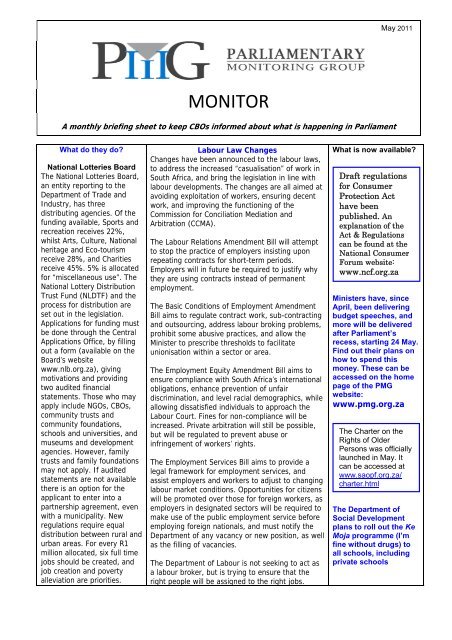
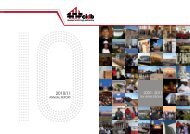
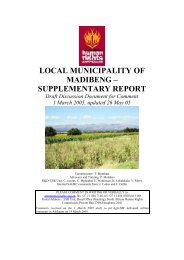
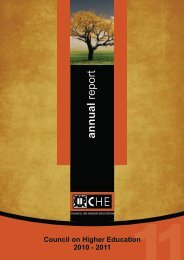
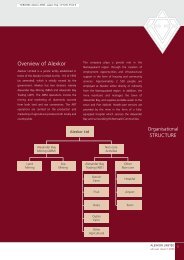
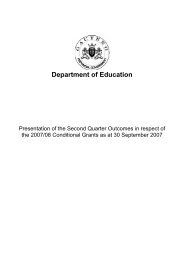
![National Research Foundation Annual Report 2008 / 2009 [Part 2]](https://img.yumpu.com/49774036/1/177x260/national-research-foundation-annual-report-2008-2009-part-2.jpg?quality=85)
